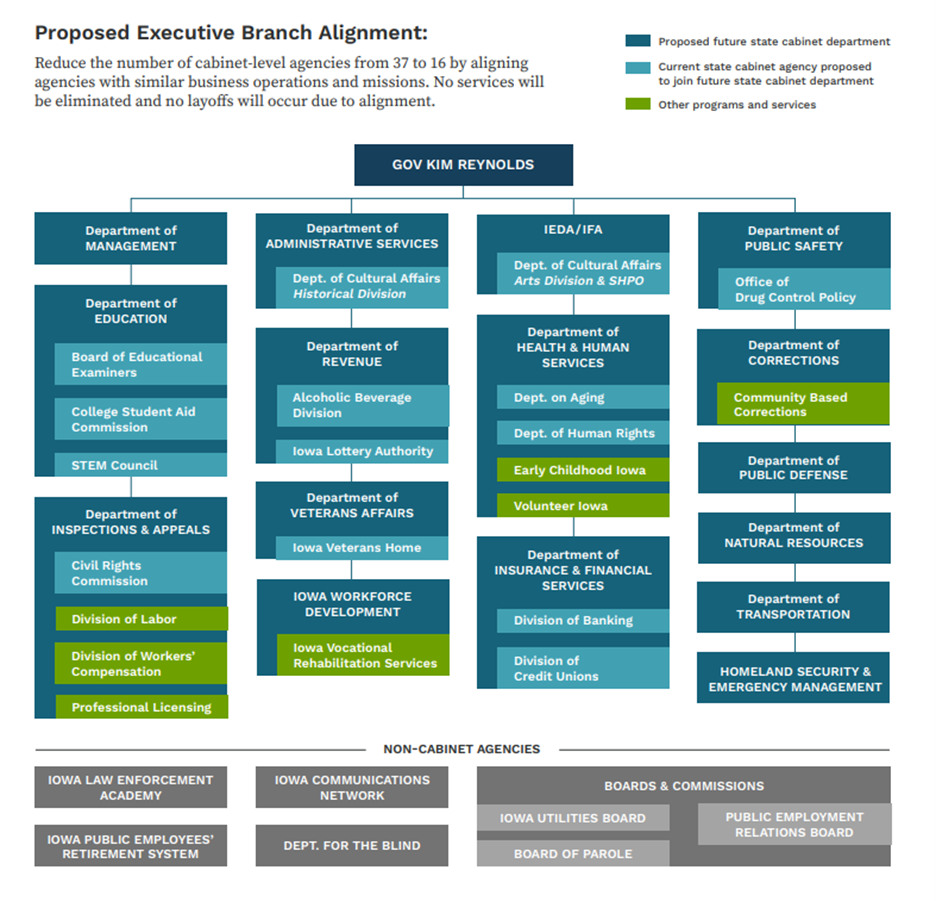The theme of this session seems to be Wednesday/Thursday winter weather. Yet again winter weather hit Wednesday and remained icy into Thursday. Legislators have been bundling up to get to the Capitol to work on session priorities, pushing to get bills through committees before the first funnel next Friday, March 3. At that point, the number of bills will be winnowed down and priorities will become clearer as we turn the corner into the second half of the session.
Policy Development Highlights
Government Realignment
The government realignment bill (SSB 1123) passed the Senate State Government Committee this week and is up for consideration by the full Senate chamber.
Governor Reynolds released this statement: “State government exists to serve Iowans, but an increasingly growing bureaucracy is making it too complicated. This bill gets to the heart of the problem, making government efficient, effective, and small. While shrinking government from 37 cabinet departments to just 16, we will also save Iowa taxpayers an estimated $215 million over four years. For Iowans and our state to thrive, government must be responsive to their needs.”
The House version of the Governor’s realignment bill (HSB 126) had four subcommittees this week and is slated for another next week.
Non-Economic Damages HF 161
The Senate passed SF 228 to put a $2 million cap on noneconomic damages in lawsuits against trucking companies whose employees caused injury, death, or other damages while on the job. Adopted during floor debate, that amount is an increase from the previously proposed $1 million cap. The bill passed 30-19, with one senator absent. GOP Senators Lofgren, Salmon, Taylor, and Westrich voted alongside Democrats against the legislation.
While supporters said the limits will protect companies against “nuclear verdicts” where juries award millions in damages, Senate Minority Leader Zach Wahls said the bill does not protect families against the painful consequences of these accidents. The bill will be available for consideration by the House, which passed HF 201 through committee earlier this month.
Property Taxes
Governor Reynolds signed SF 181 into law on Monday. The law fixes a state mistake that would have unintentionally raised property taxes for owners of residential properties. The mistake came about when a 2021 bill signed by Governor Reynolds eliminated the multi-residential property category, significantly changing the residential rollback rate. When the Legislative Service Agency found a discrepancy between the categorization and the existing Iowa Code last November, it was brought to the attention of the Department of Revenue.
Local government officials say the change will reduce total property tax revenues by up to $133 million. Cities, counties, and school districts already started making their budgets based on the incorrect information provided by the Iowa Department of Revenue. Democrats said the state should own up to the mistake and fill the gap, providing the money local governments expected would be available. The bill reached Governor Reynolds’ desk without the amendments proposed by Democrats.
A larger, more philosophical conversation about local government funding is happening in the legislature, and there are more changes expected.
CO2 Pipeline
Work on the CO2 pipeline has begun in earnest. Multiple bills have been filed regarding eminent domain in both the House and the Senate:
- Pipeline Land Surveys HF 307/SF 102)
- Pipeline Eminent Domain HF 308/SF 101)
- Pipeline Investor Information HF 309/SF 100)
- Pipeline Voluntary Easements HF 310/SF 103)
- Pipeline Negotiations HF 311/SF 104)
These bills include limits on land surveys and restrictions on the use of eminent domain. In its version of the 2022 Administration and Regulation appropriation, the House approved a moratorium on the use of eminent domain for pipelines, but a similar provision was not included in the Senate version of the Administration and Regulation budget and was not considered by the Senate.
Supporters of the CO2 pipeline report that these pipelines are environmentally friendly and necessary to benefit and sustain the ethanol industry. These interests are pitted against those that question the value of CO2 capture pipelines and believe that the concerns of Iowa landowners are being ignored.
Proposals to curb eminent domain will require pipelines to obtain voluntary easements for 90% of a planned route before receiving eminent domain authority from the Iowa Utility Board (IUB) because eminent domain should only be used for essential government services. Additional proposals will require the IUB to pause on decisions related to the pipelines until federal regulators establish safety guidelines for CO2 capture pipelines.
It is anticipated that there will be policy developed related to CO2 pipelines and eminent domain this session. What balance is struck between the interests of the pipelines and landowners is yet to be determined.
Executive Branch Update
Department of Education
Governor Reynolds announced on Friday that the Iowa Department of Education Director Ann Lebo is resigning. Director Lebo said, “It has been a tremendous honor to work alongside the dedicated team at the Department of Education and serve Iowa schools, administrators, educators, and students,” Lebo said. “The last three years have been some of the most challenging of my career, but also incredibly rewarding. I’m proud that Iowa was on the leading edge of prioritizing in-person learning throughout the pandemic and I’m thankful for Governor Reynolds’ leadership in that effort. Now, I’ve decided to explore new opportunities and I look forward to seeing where they lead.”
What’s next?
Tax Reform
With SF 181 signed into law, legislators will turn their attention to transformational property tax reform in Iowa. In the Senate, SSB 1124 on Property Tax passed the Ways and Means Committee on Tuesday and moves to the full Senate as SF 356. Meanwhile, SSB 1125 on Sales Tax passed the Senate subcommittee on Wednesday. The House has introduced its version of the Property Tax reform in HF 1.
Reorganizing State Government
SSB1123 and HSB 126 reorganize the executive branch structure, operations, and personnel to reduce the total number of cabinet-level departments from 37 to 16. Aligning Government to Better Serve Iowans is a priority Governor Reynolds announced in her Vision for Iowa. Below find the proposed Executive Branch Alignment organization chart.

As we are now one week from the first funnel deadline, the coming week will bring significant committee action as legislators work to continue moving bills through full committees to become funnel-proof and remain eligible for consideration after March 3.
The full 2023 Session Timetable can be found here.


